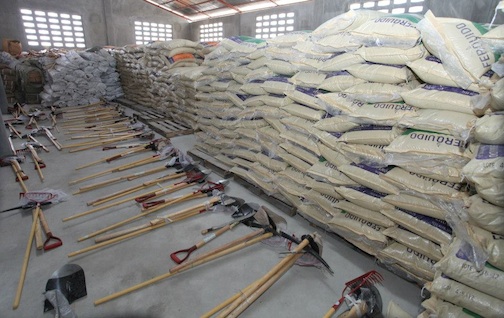Above: discounted fertilizer in Desdunes (Photo: OP Haiti)
By the Caribbean Journal staff
Haiti President Michel Martelly inaugurated a new drinking water supply and distribution system in Verrettes during a tour of the Artibonite region on Tuesday.
The system came with financial support from the Spanish government of approximately $300,000. It included the replacement of 1.5 kilometres of polyethylene piping, the construction of four water kiosks and the construction of a public fountain near the Artibonite river.
A similar water system was also inaugurated in the town of Desdunes.
Martelly was joined at the opening by Manuel Ruigomez Hernandez, Spain’s Ambassador to Haiti, along with Venezuelan Ambassador Pedro Antonio Canino Gonzalez.
Both countries are assisting Haiti on projects aimed at improving the country’s infrastructure and agriculture, particularly in the Artibonite region.
“The Haitian people with all of their hearts wish to send their congratulations to the Spanish and Venezuelan governments, which do not haggle when the Haitian people are in need,” Martelly said. “I hope that this cooperation strengthens and gives many more results in favour of the Haitian people.”
Spain’s envoy said he pledged his country’ help in the repair of Haiti’s water systems. Venezuela is currently funding a project to construct rice mills in Haiti.
By December, Artibonite will be home to 12 new farm service centres, with 20 more to come in 2013. The centres are being made possible through PetroCaribe funding from the Venezuela-led ALBA Bolivarian Alliance.
In August, Martelly was joined by Gonalez and Minister Jacques Thomas to open a new mill centre in the town of Timonette, similarly funded by PetroCaribe.
The programme also provides fertilizer and equipment to Haitian farmers at discounted prices.
Haiti’s Artibonite Valley at one time produced 125,000 tonnes of rice each year, according to government data, but that number fell to 90,000 in recent years.
The country reportedly imports approximately 350,000 tonnes of rice from abroad every year.
“The increase in rice production will fight against imported rice,” Martelly said.
